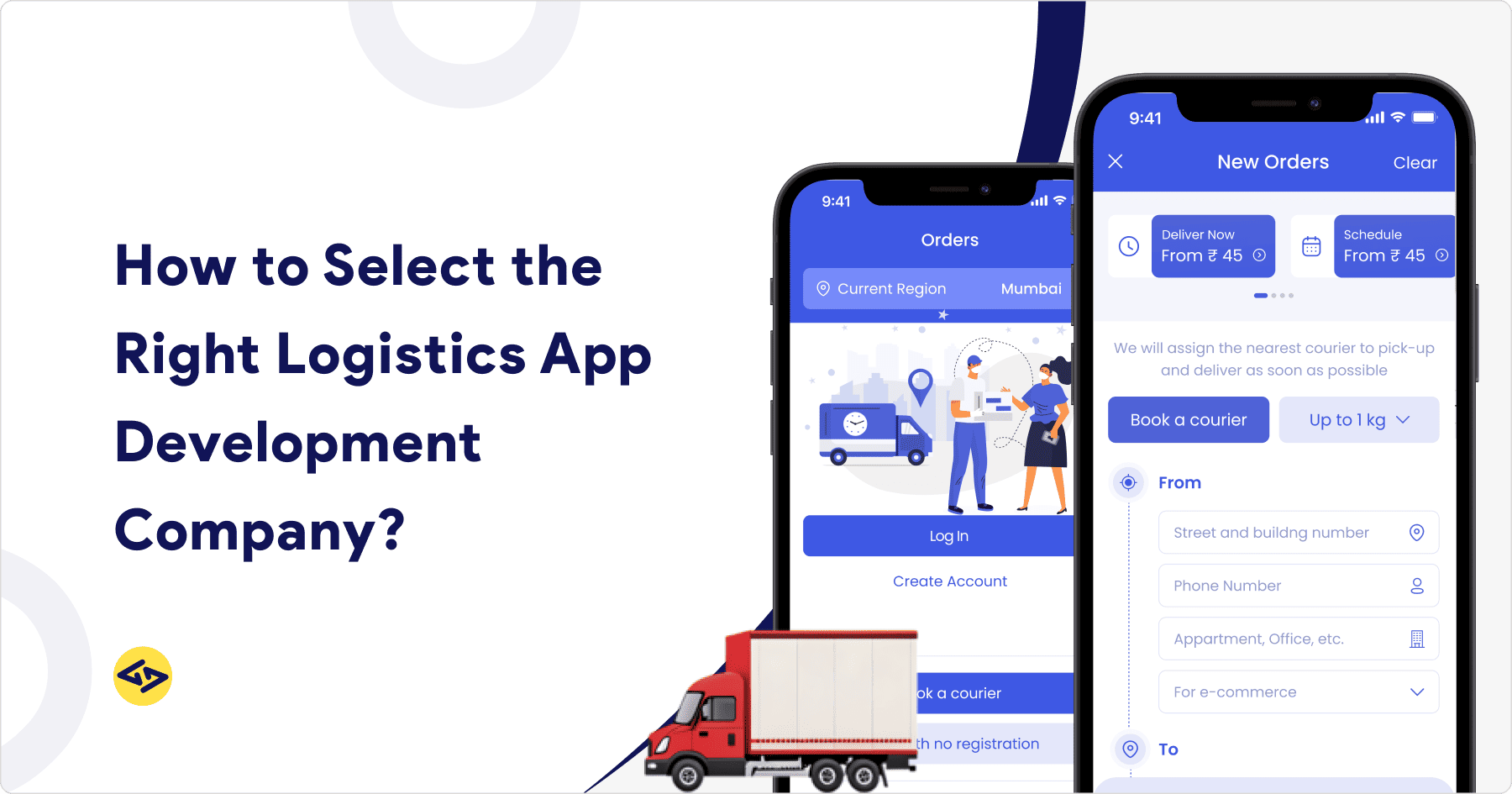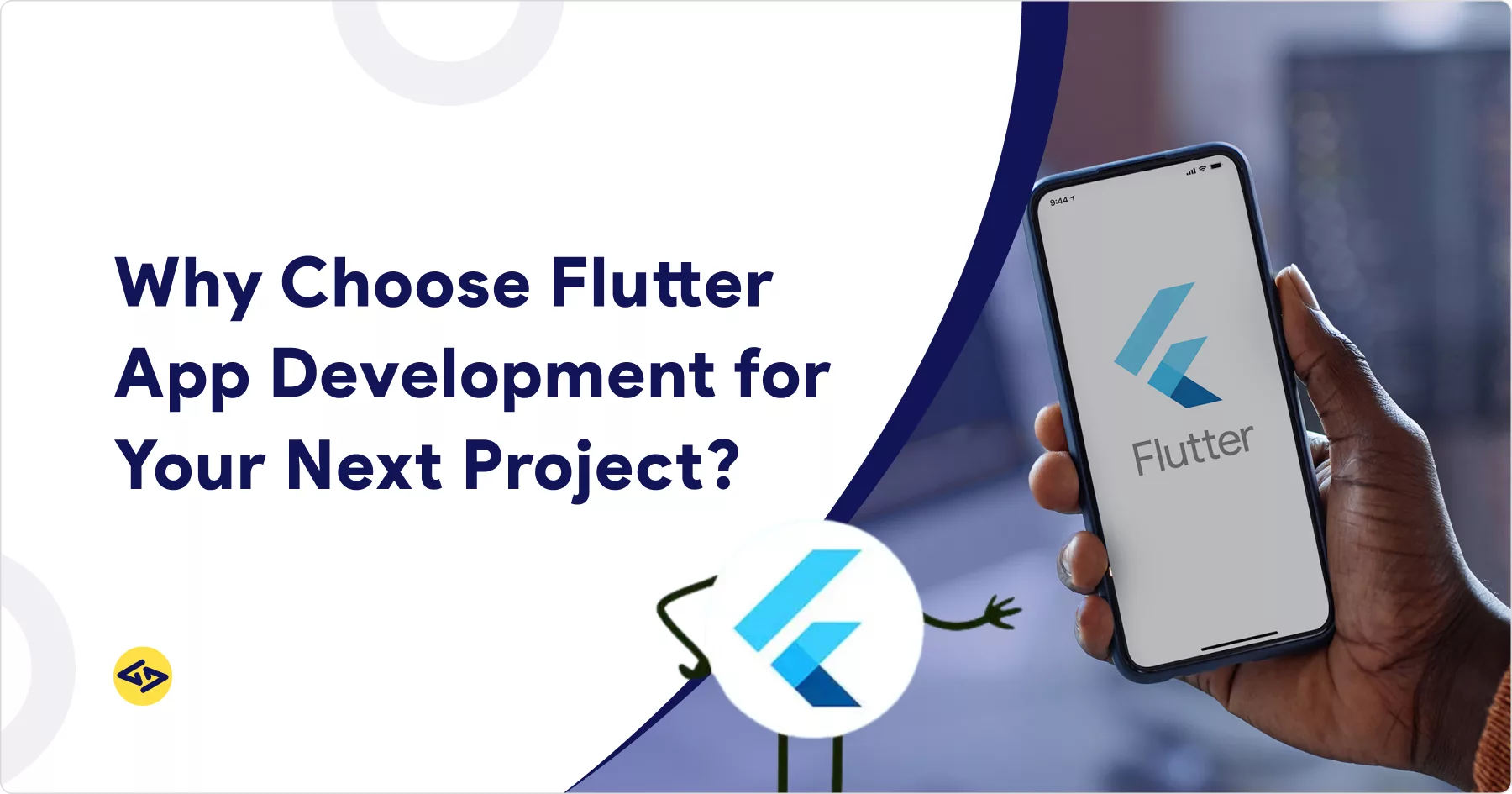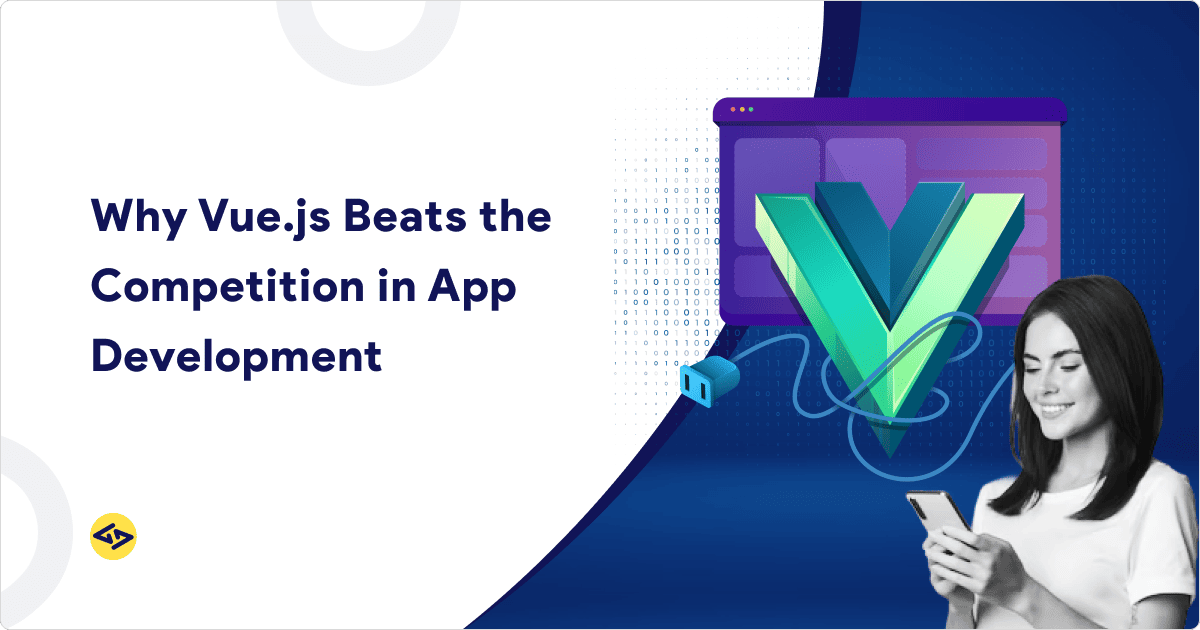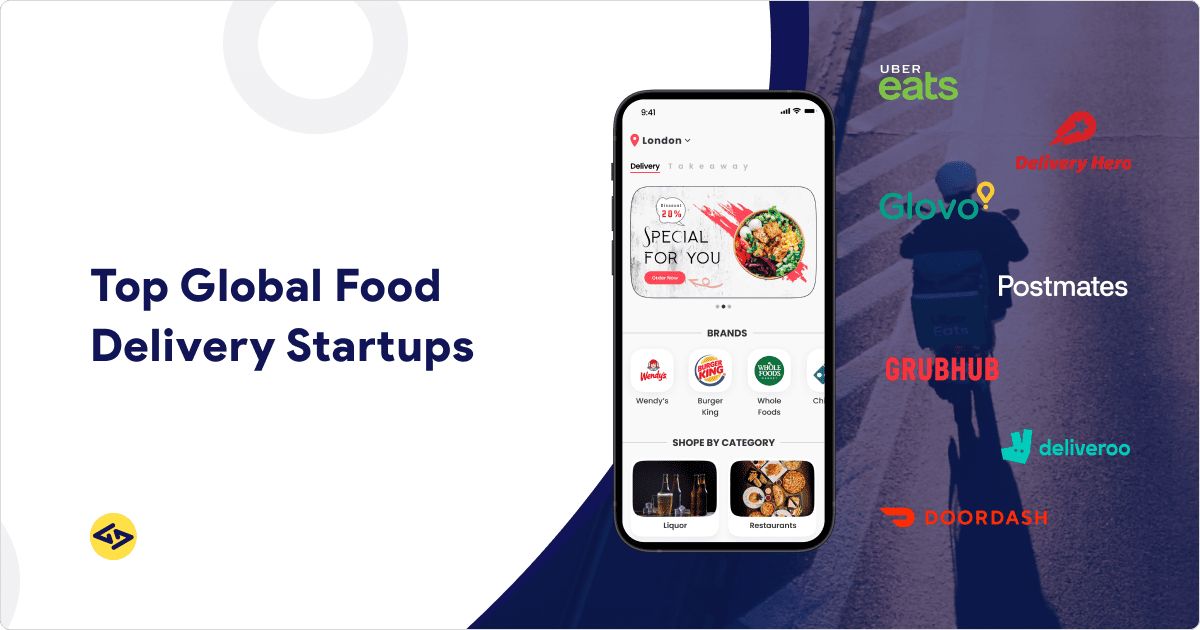The world of logistics is a high-stakes, fast-moving game. In this race, a few seconds of delay or a missed delivery can lead to a domino effect of frustrated customers, lost revenue, and a damaged reputation. But what if you could have a secret weapon that not only solves these problems but also gives you a massive competitive edge?
That’s where a custom logistics app comes in. Building one, however, isn’t as simple as hiring a few developers. It’s about finding the right partner—a company that understands the complexities of your business and can build a digital solution that truly drives efficiency. Finding the best logistics app developers requires careful consideration, but the investment pays off exponentially. The Indian logistics sector, valued at USD 228.4 billion in 2024, is projected to grow at a Compound Annual Growth Rate (CAGR) of 6.5%. With this significant growth, the need for advanced technological solutions from a top logistics app development company in India is more critical than ever.
This comprehensive guide will walk you through everything you need to know about how to choose a logistics app development company, transforming your operations from a tangled mess into a streamlined, profitable machine.
The Hidden Bottlenecks in Logistics
Imagine this: a delivery truck stuck in traffic, a warehouse manager manually tracking inventory on a spreadsheet, and a customer refreshing a tracking page with no updates. These aren’t just minor inconveniences; they are hidden bottlenecks that plague the logistics industry.
Here’s a closer look at the common pain points:
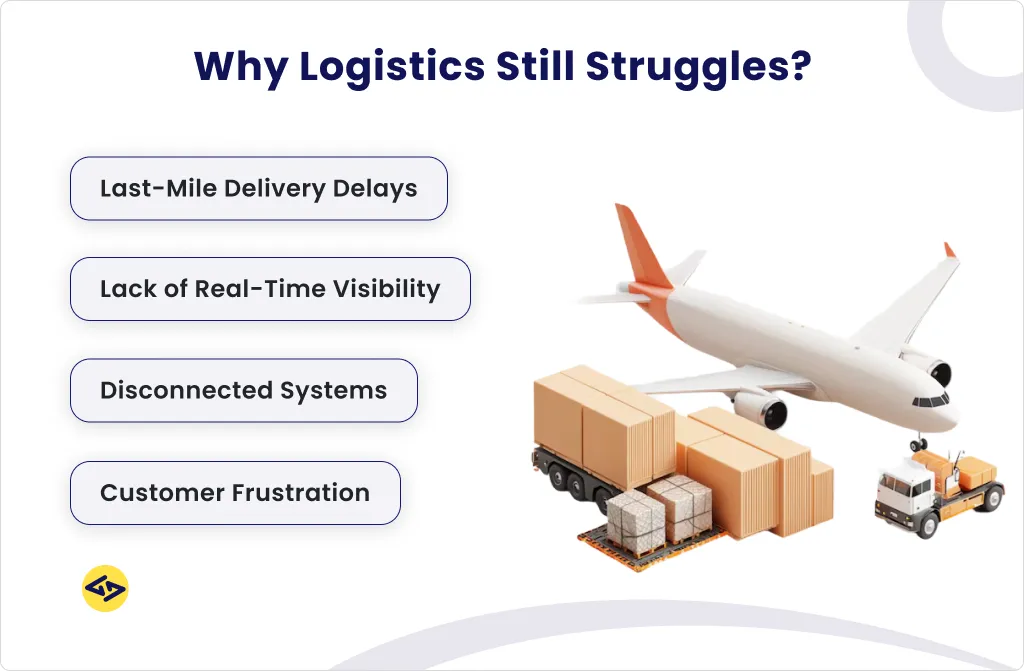
Last-Mile Delivery Delays: This is the most challenging and expensive part of the supply chain. Unexpected route changes, failed deliveries, and inefficient planning lead to significant delays and costs.
Absence of Real-Time Visibility: Without real-time visibility into your fleet, inventory, and shipments, you’re operating blind. This makes it impossible to respond quickly when problems arise.
Disconnected Systems: Some logistics companies operate a combination of disparate systems. For example, they might use a TMS (Transportation Management System) to manage the fleet, a WMS (Warehouse Management System) to manage inventory, and an ERP (Enterprise Resource Planning) to handle finances. These systems rarely communicate with each other, resulting in data silos and manual data entry headaches.
Customer Frustration: In today’s on-demand economy, consumers expect real-time updates and accurate delivery estimates. This is where on-demand logistics app solutions become essential. Fail to meet these expectations, and customers will quickly switch to competitors.
Outdated, manual processes don’t just slow you down; they also lead to lost money, compliance risks, and a constant state of putting out fires. A well-designed logistics app can solve these problems by serving as a central nervous system for your operations. But to build it correctly, you need the right partner.
Why Choosing the Right Tech Partner is Critical: How to choose a logistics app development company
Logistics is uniquely complex compared to other industries. It’s governed by strict regulations, operates on razor-thin margins, and involves a complex web of assets, people, and data. This is why a generic development company, no matter how talented, might not be the right fit.
Hiring the wrong vendor can lead to:
Wasted Investment: The vendor might deliver a visually appealing app, but if it doesn’t address your core business problems, the money spent becomes a sunk cost.
Poor Scalability: The app might work for your current size, but it will crumble under the pressure as your business grows. This means rebuilding from scratch just when you need the app most.
Compliance Risks: Without an understanding of logistics regulations (like GDPR for data or CTPAT for security), the app could expose you to legal and financial penalties.
A strategic partner, on the other hand, does more than just write code. They act as consultants who deeply understand your industry, analyze your unique challenges, and build a solution that is robust, scalable, and compliant. They are invested in your long-term success, not just a one-time project.
Your Essential Logistics App Development Company Checklist
To identify the right partner, you need a clear checklist. Here are the key criteria to evaluate a potential logistics software vendor:
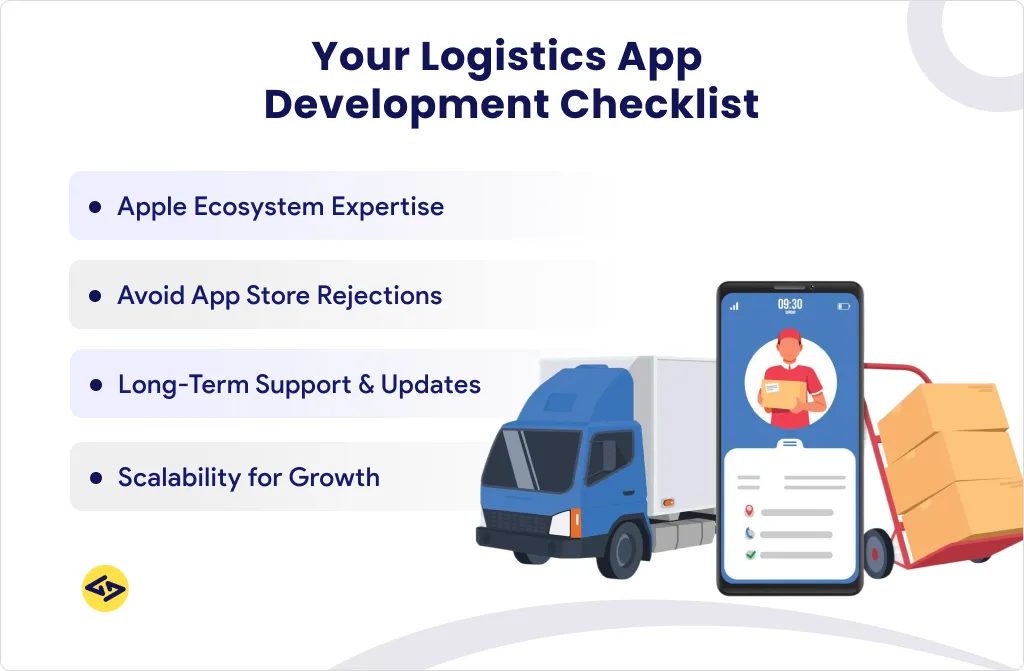
Proven Industry Experience:
This is non-negotiable. Look for a company that has a portfolio of successful projects in the logistics and supply chain sector. Ask for case studies, client testimonials, and success stories. Ask: How many logistics apps have you built? What was the ROI for your clients? A supply chain app development company that has already tackled challenges like route optimization or warehouse management for other clients will have a head start and a deeper understanding of your needs.
Technical Expertise:
Beyond experience, technical capabilities are crucial. Check if the company has experience building core logistics functionalities, such as:
GPS Tracking: Real-time vehicle and shipment tracking.
Route Optimization: AI-driven algorithms that find the most efficient routes, saving time and fuel.
Fleet Management: Tools to manage vehicle maintenance, driver schedules, and fuel consumption.
Shipment Tracking: A system that provides customers and managers with live updates on packages.
AI/ML Integration: The ability to use predictive analytics for demand forecasting or to identify potential delivery issues before they happen.
Customisation & Scalability:
Every logistics business has its own unique processes. Your app should be a perfect fit, not a one-size-fits-all solution. For instance, a cold-chain logistics company needs temperature monitoring, while an e-commerce logistics firm prioritizes last-mile optimization. Ensure the company is skilled at creating custom logistics app development services. Additionally, the app must be scalable, meaning it can handle a sudden increase in users, shipments, or data without a hitch.
Security & Compliance:
Logistics deals with sensitive data—from customer addresses to confidential shipment details. A single data breach can be catastrophic. Data breaches cost logistics companies an average of $4.45 million, according to IBM’s 2023 report. The company must have a security-first approach and a deep understanding of industry regulations like GDPR, ISO 27001, and CTPAT. Ask them about their data encryption methods and security protocols.
Integration Capabilities:
Your new app cannot operate in isolation. It needs to seamlessly connect with your existing systems, including your ERP, WMS, and TMS. The company should have a strong track record of successful integrations with popular logistics platforms and IoT/telematics systems.
Support & Maintenance:
The relationship doesn’t end after the app is launched. Technology evolves, regulations change, and bugs can appear. Without ongoing support, your app becomes obsolete within 12-18 months. The company should offer robust post-launch support and maintenance plans to ensure the app remains secure, up-to-date, and fully functional.
Questions to Ask a Logistics Software Vendor
Before deciding, conduct thorough vendor interviews. Here are some of the most important questions to ask:
“What logistics-specific apps have you built before? Can you show me?” This gets straight to the point and lets you see their work firsthand.
“How do you handle last-mile delivery optimization?” Listen for a detailed answer that goes beyond just GPS tracking. A good answer will mention route planning, real-time traffic data, and driver-specific needs. Red flag: vague answers like ‘we use advanced algorithms.’
“Can you integrate with our existing ERP/WMS/CRM systems?” This is a critical question. Ask them to explain their process for integrating with your specific systems.
“How do you ensure data security and compliance with regulations like GDPR?” Their answer should demonstrate a clear, proactive approach to data protection.
“What is your approach to post-deployment support?” Look for a clear and transparent plan for bug fixes, updates, and ongoing assistance.
“How do you future-proof apps with new technologies like AI, IoT, or blockchain?” The best companies are forward-thinking and can build a solution that can evolve with the industry.
Evaluating Logistics Software Proposals
Once you receive proposals, don’t just compare the bottom-line price. A cheap proposal can turn out to be the most expensive mistake you’ll ever make.
Here’s how to evaluate proposals beyond pricing:
Functionality: Does the proposal’s list of features align perfectly with your operational needs? Is it tailored to you, or does it feel like a generic, copy-pasted list?
Scalability: Does the proposal mention how the app will handle growth? Look for mentions of cloud-based architecture, microservices, or other scalable technologies.
Timeline & Delivery Model: Understand their project methodology. Is it an Agile approach, which allows for flexibility and quick adjustments, or a rigid waterfall model? Agile is often a better fit for complex projects. Agile means you see progress every 2-3 weeks and can make changes along the way.
Support & Warranty: Does the proposal include a warranty period and details about post-deployment support? A lack of this is a major red flag.
Red Flags to Watch Out For:
Vague Feature Lists: If the proposal is short on details and long on buzzwords, be cautious.
Unrealistic Promises: If a company promises a complex app in an impossibly short timeframe, they might be overpromising and will likely underdeliver. Complex logistics apps typically take 6-12 months to develop properly.
Lack of Logistics Case Studies: If they can’t show you relevant work, they likely don’t have the specialized knowledge you need.
Hiring a Logistics Tech Partner vs. Just a Vendor
This is the most crucial distinction you need to make.
A vendor is someone you pay to deliver a specific product or service. They deliver code and disappear—it’s purely transactional.
A partner invests deeply in your success. A true partner will:
Advise on Best Practices: They won’t just build what you ask for; they will advise you on the most efficient way to solve a problem, based on their industry experience.
Provide Long-Term Support: They’ll support you for years, not just the 90-day warranty period, helping you with updates, new features, and a changing market.
Act as a Consultant: They will work with you to optimize your business operations, not just your technology.
Choosing a partner ensures you have someone in your corner who can help you navigate the ever-evolving landscape of logistics technology.
The Logistics App Development Process (Step-by-Step)
You can judge a company’s professionalism by understanding its development process. A well-structured process typically follows these steps:
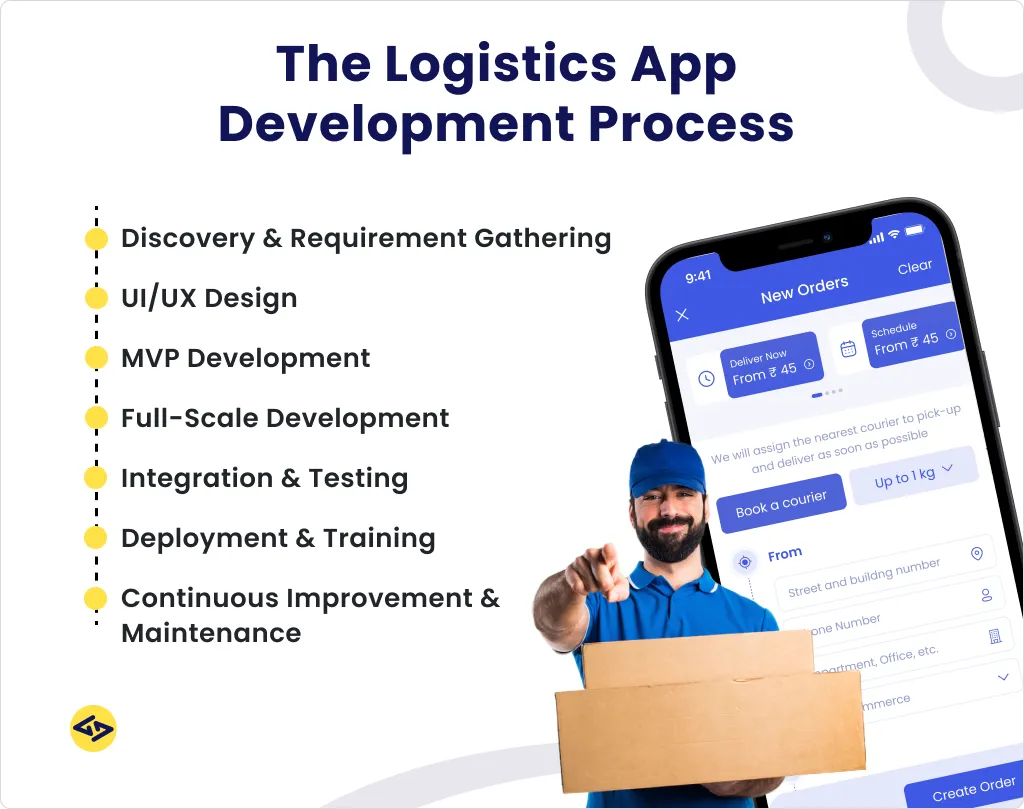
Discovery & Requirement Gathering:
The company will meet you and your team to gain insight into your workflows, pain points, and goals. They will come up with detailed questions to establish a clear project roadmap. This phase typically takes 2-3 weeks.
UI/UX Design:
They’ll create user-friendly interfaces for all user types: drivers, warehouse managers, office staff, and customers.
MVP Development:
They will create a Minimum Viable Product (MVP) with basic features to test the app in the real world. This will enable you to solicit user feedback and test the idea early. This saves money by validating concepts before full development.
Full-Scale Development:
Once the MVP is proven to be valuable, it will be expanded with all the advanced features, including AI-based routing, predictive analytics, and advanced reporting tools.
Integration & Testing:
The app integrates with your existing systems (ERP, TMS, etc.) and undergoes comprehensive testing.
Deployment & Training:
The app goes live, and your team receives complete training for smooth adoption.
Continuous Improvement & Maintenance:
The partnership will also include regular updates, bug fixes, and the development of new features as your business and the industry grow. This includes monthly updates, immediate bug fixes, and quarterly feature releases.
Final Pre-Decision Checklist
Before making your final decision, verify these critical points:
Domain Expertise: Does the company have in-depth knowledge of logistics?
Technical Abilities: Can they deliver logistics essentials like transportation management app development, GPS tracking, and fleet management?
Integration Capabilities: Have they demonstrated the ability to integrate with WMS, TMS, and ERP?
Security-First Approach: Do they prioritize data security and regulatory compliance?
Clear Pricing & Realistic Delivery Timelines: Is their pricing clear, and are their timelines realistic? Beware of quotes that seem too good to be true—they usually are.
Long-Term Relationship Approach: Are they committed to a long-term partnership beyond project delivery?
Conclusion: The Smart Path to Digital Transformation
Choosing the right logistics mobile app development services is fundamentally a strategic business decision, not just a technical one. Making the wrong decision can cost you money and business opportunities and leave you in a continuous state of inefficiency and frustration.
But the right partner can transform your operations from chaos into a streamlined, data-driven growth engine. They will deliver the transparency, automation, and intelligence you require through robust logistics automation software to minimize costs, satisfy customers, and maintain a competitive edge.
Don’t get stuck with outdated technology and poor development practices. Make the smart choice. Partner with a company that has a clear path towards your digital transformation and a vision to help you develop a custom mobile application that can propel your business further in the years ahead.
Ready to hire logistics app developers to transform your logistics operations? Contact us today for a free consultation.
Don’t risk your app’s success.
Choose a reliable logistics app development company now.

